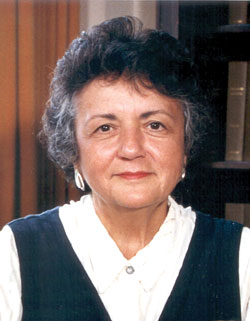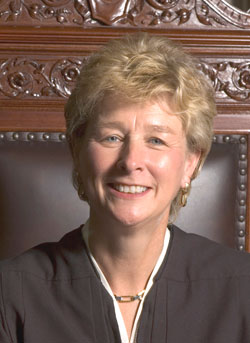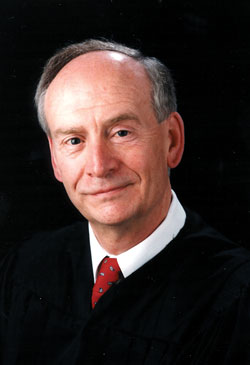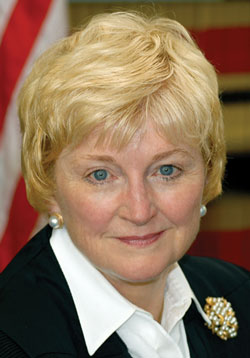The Badgering State: Wis. Battles over Worker's Rights and Skirmishes in the Supreme Court

If you believe Wisconsin Supreme Court Justice David T. Prosser Jr., he just wanted to get out a press release. It was June 13, and the justice wanted to announce a decision involving Gov. Scott Walker’s controversial 2011 budget bill eliminating most government employee collective bargaining rights.
What followed was a donnybrook among the justices. Before it was over, Prosser stood accused of putting fellow Justice Ann Walsh Bradley in a choke hold. Bradley was accused of putting her fist in Prosser’s face. And the Dane County Sheriff’s Office was placed in the uncomfortable position of having to investigate.
In a year filled with political volatility, including a hostile public standoff in the state legislature over the labor rights of the state’s public employees, perhaps the worst evidence of dysfunction in the Badger State proved to be allegations of bad tempers and fisticuffs in the state’s highest courts.
Ultimately, a special prosecutor appointed by the chief judge of the Dane County Circuit Court decided not to file charges against Prosser or Bradley. That didn’t stop the county sheriff’s department from publishing its incident reports, making public all seven justices’ accounts of the court’s long-standing tensions.
Prosser and Bradley denied that they meant to hurt each other that Monday evening. But whatever happened, the reports indicate that the fight was sparked not by either’s passion for or against collective bargaining. Rather, it seems that tempers escalated from long-standing disagreements that got personal.
The recent fracas played out over some hard-fought and expensive judicial campaigns, as well as justices facing ethics complaints. Add to that a feisty chief justice whom many lawyers consider testy and arrogant, and a tight election that Prosser won against an unlikely candidate who ran after protests against Walker’s “budget repair bill.”
Politics were already tense in Madison, where thousands of pro-labor demonstrators amassed at the capitol building, protesting Walker’s collective bargaining cuts. The situation got so bad that the state’s 14 Democratic senators fled south to Illinois to prevent a quorum on the legislation.

Illustrations of justices David Prosser and Ann Walsh Bradley by Andrea Ventura.
A POTENT MIX
It’s all made the state of Wisconsin a crucible for political polarity and for a contentious supreme court that, in one way or another, reflects it.
“At this point it’s about 50 percent politics and 50 percent personalities,” says Gerald Mowris, a former State Bar of Wisconsin president who is a litigation partner with Madison’s Pellino & Mowris.
The latest brouhaha among the justices came when the high court was asked to review State ex rel. Ozanne v. Fitzgerald, which sought to invalidate Walker’s proposed dismissal of collective bargaining rights, among other budget-cutting measures. Opponents claimed the Republicans tried to move the bill through committee without giving 24-hour public notice, a violation of the open meetings law.
A lower court agreed; on May 27 it permanently enjoined the law from taking effect. The case quickly went to the supreme court, where it was argued June 6.
Jeff Fitzgerald, the speaker of the Wisconsin State Assembly, had said that if there was no supreme court opinion by June 14, the legislature would have to vote on the matter all over again.
Four of the seven justices agreed to overturn the lower court. Justice Patience Drake Roggensack would prepare a draft order to vacate the county circuit court ruling, joined by Justices Michael J. Gableman and Annette Kingsland Ziegler. The court may act under original jurisdiction, they wrote, and may dismiss the case for violating the separation of powers.
Prosser wrote a concurrence, endorsing the majority. “No matter how long we waited to consider a perfect appeal, the legal issues before the court would not change,” Prosser wrote. “Delaying the inevitable would be an abdication of judicial responsibility.”

Chief Justice Shirley Abrahamson was appointed to the Wisconsin Supreme Court in 1976 by Democratic Gov. Patrick Lucey, was elected to it three years later, and won re-election in 1989, 1999 and 2009. Formerly in private practice, Abrahamson has served as chief justice since 1996. Her term expires July 31, 2019.
Bradley, Chief Justice Shirley S. Abrahamson and Justice N. Patrick Crooks dissented. Abrahamson dismissed Prosser’s concurrence as “long on storytelling that appears to have a partisan slant.” Crooks, joined by Abrahamson and Bradley, dissented separately.
Nevertheless, said Prosser, there was an “absolutely clear understanding” that the court’s decision would go out by June 13. Prosser, 69, a former state assembly speaker, told detectives that Abrahamson was stalling.
Efforts to contact the justices through the court information officer were unsuccessful.
When Abrahamson’s dissent didn’t come by afternoon, the majority sent her emails demanding the order be released. She said she’d finished her opinion and would circulate a draft to everyone by Tuesday morning, June 14, at the latest.
Prosser’s assistant sent Abrahamson another email requesting that the court information office issue a press release. According to Prosser, the other justices in the majority wanted to release their order regardless of what Abrahamson said.
Prosser then told colleagues he would talk to Abrahamson. Roggensack, Ziegler and Gableman went with him.
“Thank God the other three followed me,” Prosser told detectives.
The chief justice was in Bradley’s office, where the pair worked on their dissent. Abrahamson said nothing would be released until everyone was finished writing, according to reports. Also, Abrahamson said, a press release may not go out until the end of the month. According to Prosser, Abrahamson had a “change of focus” and told him they had not agreed on a dissent yet.
“Chief justice, I have lost confidence in your ability to lead this court,” Prosser said.
According to Prosser—a soft-spoken man who reportedly can quickly lose his temper—he never entered Bradley’s office. After the incident he used a yardstick to measure where he had stood, he told detectives. Bradley “charged me,” Prosser said. He said he put up his hands in self-defense and they landed on Bradley’s neck.
Detectives asked Prosser what happened next. “What does any self-respecting man do when suddenly that man finds that his hands … are on a woman’s neck?” Prosser responded. “Get them off the neck as soon as possible.”

Anne Walsh Bradley, a former county circuit court judge, was elected to the state supreme court in 1995. She was re-elected in 2005. Her term expires July 31, 2015.
Bradley, a former county circuit court judge, had a different version. The four approached her and the chief justice in her office, Bradley told detectives, and suggested that Abrahamson was just one vote.
According to Bradley, Prosser’s voice rose as he spoke. She told him,“David, we are no longer willing to put up with your yelling and abusive behavior.”
Prosser continued to push for the press release. Bradley said they didn’t get Prosser’s concurrence until that afternoon and had been working nonstop.
Prosser said he notified the court about his concurrence Friday by email. Bradley searched for Prosser’s email while they spoke. He asked Bradley if she was calling him a liar, she told detectives, and Prosser started to get “worked up” again, telling Abrahamson he’d lost all confidence in her.
Then Bradley, a 61-year-old mother of four and a former high school teacher, left her desk and walked toward Prosser. “Buddy, don’t raise your voice again,” Bradley said. “You get out of my office.”
Bradley, who is 5-foot-3 and weighs around 30 pounds less than Prosser, admitted that she got close to Prosser, and did so because she meant business.
That’s when Prosser allegedly assaulted her. According to Bradley, Roggensack pulled her back, and Prosser left Bradley’s office immediately with Gableman.
Bradley called Wisconsin Capitol Police Chief Charles Tubbs, and two days later he and the court’s human resources officer met with the justices. Bradley maintained that Prosser had her in a choke hold.
“Ann, you do goad him,” said Roggensack, an ex-state court appellate justice. Abrahamson needles Prosser, Roggensack later told detectives, and when Prosser gets upset Bradley steps in to defend Abrahamson.
Tubbs told the justices that having your hands around someone’s neck was not acceptable, and he wanted a commitment from them that there would be no violence in the workplace.
“You don’t have all the facts,” said Gableman, a former district attorney and county circuit court judge, who like Roggensack and Ziegler often votes with Prosser.

Michael Gableman was elected to the supreme court in 2008, he previously was a county circuit court judge and served as district attorney for Ashland County. His term expires July 31, 2018.
ANOTHER SIDE OF THE STORY
According to Gableman’s incident report, Prosser, in a “meek and intently sincere” voice, told Abrahamson he’d lost all confidence in her. Then Bradley got up, walked toward Prosser and put her fist in his face.
“He didn’t choke you; he pushed you to get your fist out of his face,” Gableman told Bradley afterward.
Gableman also told detectives about a previous interaction when he made a joking comment to Abrahamson, calling her by her first name. Then, Gableman told detectives, Bradley came over and hit him on the back of the head, telling him he needed to show respect to the chief justice.
“Justice Gableman said that he believed Justice Bradley was not joking, because nobody was laughing at the time,” the incident report states.
Initially Gableman told detectives that this happened on Sept. 18, 2008, which he remembered because it was his birthday. After the incident reports were released to the public, Bradley told the Wisconsin State Journal that the court did not even meet on that date. Then Gableman released a statement saying that the incident occurred a year later.
Janine Geske, a former Wisconsin Supreme Court justice, described Gableman’s description as “bizarre” to the newspaper. Everyone at the court calls the chief justice by her first name, Geske said, including the custodial staff.
Abrahamson’s incident report about June 13 is mild compared with those of her colleagues. However, she told detectives that Prosser has “temper tantrums,” and “you never know what is going to set him off.”
Yet many Wisconsin lawyers blame Abrahamson for the court’s dysfunction. They say she is very smart and very difficult to deal with.
Abrahamson, 78, was appointed to the supreme court in 1976. The state constitution mandates that the chief justice spot goes to whoever has the most seniority, and Abrahamson has held the position since 1996.
Abrahamson has been re-elected four times. Over the years she’s collected nearly $2.3 million in campaign contributions—more than any other Wisconsin judicial candidate. Most of her campaign money comes from labor.
Abrahamson was the first female name partner in Madison, the first woman to gain tenure at the University of Wisconsin Law School and the first female Wisconsin Supreme Court justice. In 1995 she received the American Bar Association’s Margaret Brent Women Lawyers of Achievement Award.
A New York native who went to Indiana University for law school, Abrahamson came to Wisconsin 50 years ago with her husband, Seymour, now a professor emeritus of genetics and zoology at UW-Madison.
Detractors agree that Abrahamson, who was considered for the U.S. Supreme Court seat that went to Ruth Bader Ginsburg in 1993, has many accomplishments. They allow that gender could play a role in people’s assessment of her, and acknowledge that sometimes the state has a preference for natives.
But they also say Abrahamson is arrogant and uses a hammer to try to get consensus.
“When she analyzes and comes to a conclusion, she sometimes would belittle and denigrate those who would take a different point of view,” says Franklyn M. Gimbel, a former state bar president and a litigation partner with Milwaukee’s Gimbel, Reilly, Guerin & Brown. “There’s a certain arrogance about her that contributes to this whole genre of reasons why people who feel they’re on the same plane as her don’t want to be treated as subordinates.”

N. Patrick Crooks was elected to the Wisconsin Supreme Court in 1996 after spending 19 years as a county circuit court judge. Crooks was re-elected in 2006. His term expires July 31, 2016.
PRICEY POLITICS
Yet the personality conflicts dovetail with the feisty political atmosphere taking over judicial elections in the state and throughout the nation.
When Prosser ran for re-election last April, many thought it would be an easy race. But after the state capitol protests and publication of the justice’s squabbles, JoAnne Kloppenburg, a state assistant attorney general, jumped in as an opponent.
Initially, the results showed that Kloppenburg won by 204 votes. Then a county clerk announced that she forgot to count the city of Brookfield’s votes. That gave Prosser a lead of 7,000. A recount determined that Prosser won by 7,006 votes.
According to the Associated Press, it was the most expensive supreme court race in state history. Outside groups had spent a record $3.58 million, according to the Brennan Center for Justice, a New York University program that tracks spending on judicial races.
The number exceeds the estimated $2.75 million groups spent on 2008 issue advertisements attacking Gableman’s opponent, Justice Louis B. Butler.
Butler, a former state public defender and municipal judge, was the first African-American to sit on the state supreme court. Butler was appointed to the court in 2004 and his defeat marked the first time in 40 years that Wisconsin voters did not elect a sitting justice.
Wisconsin Manufacturers & Commerce, which the Milwaukee Journal Sentinel has described as the state’s largest business trade association, spent almost $1.8 million on ads supporting Gableman. The year before, in 2007, the WMC spent an estimated $2.2 million backing Ziegler, according to the Wisconsin Democracy Campaign.
The Greater Wisconsin Committee, a progressive group, spent $1.5 million on television advertisements supporting Butler.
One ad supporting Gableman offended many in the legal community. It stated that Butler worked “to put criminals on the street.” It also accused him of finding a loophole in the law to release Reuben Lee Mitchell, a convicted child molester. According to the advertisement, Mitchell “went on to molest another child.”
Butler was a state appellate defender representing Mitchell—which the ad did not mention—and he argued that the trial court erroneously violated Wisconsin’s rape shield law in Mitchell’s case. An appellate court agreed, as did the Wisconsin Supreme Court. However, the supreme court found that the evidentiary hearing error was harmless, and Mitchell’s appeal was denied. After completing his sentence he was released, and later raped another child.
Gableman supporters said the ad was a response to accusations that Gableman was soft on crime and bought his Burnett County Circuit Court seat through campaign contributions to former Gov. Scott McCallum.
The Wisconsin Judicial Commission found in 2009 that Gableman’s advertisement violated the state’s code of judicial conduct because it misrepresented a fact concerning an opponent. It recommended bringing ethics charges against him.
Defended by James Bopp Jr., a well-known Terre Haute, Ind., lawyer who represents conservative politicians, Gableman maintained that the rule violated his First Amendment rights.
A judicial conduct panel of state court appellate and trial judges granted Gableman’s motion for summary judgment. Their decision went to the Wisconsin Supreme Court.
Gableman filed a motion requesting a recusal from Justice Crooks, arguing that Crooks lodged “gratuitous personal attacks” against him. The falling out appeared to have been recent, although efforts to find out why the two broke apart were unsuccessful. Gableman clerked for Crooks in the early 1990s, the Milwaukee Journal Sentinel reported, and in 2008 Crooks swore Gableman in as a supreme court justice.
Crooks nixed the request, stating that it’s a judge’s duty to try each case on its merits. Ultimately, Abrahamson, Bradley and Crooks found that Gableman did violate the ethics rule, while Prosser, Roggensack and Ziegler disagreed.
In July 2010 the Wisconsin Judicial Commission dropped the case against Gableman, saying it didn’t have the power to pursue it further.

Annette Kingsland Ziegler, a former county circuit court judge and assistant U.S. attorney for the Eastern District of Wisconsin, was elected to the supreme court in 2007. Her term expires July 31, 2017.
STOKING THE IRE
Mike McCabe, executive director at the Wisconsin Democracy Campaign, acknowledges that the state supreme court historically has had fighting among justices. But he thinks that having to judge colleagues on ethics issues has made the climate there much worse.
“This is an awful lot for this group to handle without being dysfunctional, and they’ve proven they’re unable to handle it without being dysfunctional,” he says.
Indeed, Gableman’s case marked the second time recently that a justice’s ethics were questioned. In 2007 the Wisconsin ethics board brought a complaint against Ziegler while she ran for the state supreme court. According to the complaint, Ziegler, as a circuit court judge, heard cases involving the West Bend Savings Bank at which her husband, real estate developer J. J. Ziegler, served as a director.
The claim was settled, with Ziegler not contesting the investigation and paying the ethics board a forfeiture of $5,000. The settlement states that the board found no evidence of Ziegler using her position as a judge to obtain financial gain for herself or her family.
When Ziegler ran for the supreme court in 2007, she spent $832,746 of her own money on the campaign, according to a report published by the National Institute on Money in State Politics. Her husband’s grandfather, Bernard C. Ziegler, founded a small insurance business that eventually became the specialty investment bank.
“It sort of undermines the legitimacy of the court. People figure Ziegler and Gableman were pushed in by money, and really don’t deserve to be there,” a University of Wisconsin Law School professor, who asked not to be identified by name, told the ABA Journal. “Basically, Shirley Abrahamson is very smart, and that has not necessarily been the calling card of the Wisconsin Supreme Court.”
Crooks, who was not present at the June 13 incident but was later interviewed by detectives, recalled being called a “viper” by Prosser, in a fit of anger.
It happened in 1999, three years after Crooks joined the supreme court, and the remark was made because Crooks didn’t support Abrahamson in her re-election.
Crooks told detectives that Prosser “loses his cool repeatedly,” often turning red and pounding his fists on tables. Crooks also told detectives that he and Bradley met with the state courts director in 2010, asking that something be done with Prosser because they felt there had been an escalation in violence.
Jon P. Wilcox, who retired from the supreme court in 2007, served with Abrahamson, Prosser, Bradley and Crooks. He wouldn’t opine on why Prosser’s relationship with Abrahamson seems to have deteriorated. But according to Wilcox, Abrahamson is difficult.
“Being brilliant is one thing, but getting along with people is something else,” Wilcox says. “To have this public bickering is very demeaning, and it hurts the whole judiciary. It makes them look petty and small.”
Although Crooks now appears to side with Abrahamson, he and Wilcox reportedly were two of three justices who, during Abrahamson’s 1999 re-election campaign, asked lawyers throughout the state to support her challenger, Sharren Rose.
The 1999 fracas is detailed in a spring 2002 article in the Marquette Law Review: “The Print Media and Judicial Elections: Some Case Studies from Wisconsin.” During Abrahamson’s 1999 campaign Crooks and three other justices released a signed statement describing Abrahamson as confrontational and dismissive during closed conferences. They also stated that Abrahamson responded rudely to them when they tried to assert their roles in running the court system.
In response, Abrahamson supporters claimed that one of the justices, William A. Bablitch, was provoked because she ordered solitaire and other games removed from the court’s computers. Court watchers noted that while they appeared to have personal issues, Bablitch and Abrahamson generally voted together on opinions.
The justices not supporting Abrahamson, whom the press started referring to as the “Gang of Four,” reportedly tried to strip Abrahamson of her administrative powers that year. The plan was abandoned, according to the law review article, when she threatened to sue them, based on what she saw as an unconstitutional infringement on her powers as chief justice.
Abrahamson maintains too much control over court administrative offices, Wilcox says, and some justices still find that offensive. He mentions the court’s information office, which came up repeatedly as the justices recalled to detectives the alleged choke-hold incident. The information office was intended to work for the entire court, according to Wilcox, but it’s been co-opted by the chief justice.
“There’s been a lack of sharing on the court, which has existed for about 14 or 15 years,” he says. “They’re a court of seven; no one stands out. The only reason someone gets to be chief is because that’s the person that was there the longest.”
According to Mowris, it takes some a while to get used to Abrahamson. “People who are new to the court are probably less likely to put up with the things she says than others,” he says. “They get to know her and realize it’s not personal.”
Also, it’s possible that some of Abrahamson’s colleagues have had problems taking directions from a woman, says Deborah Rhode, a Stanford Law School professor whose work focuses on gender, law and public policy. She notes that many studies suggest women in leadership positions face trade-offs that men don’t.
“What’s assertive in a man is abrasive in a woman,” Rhode says, mentioning a report on women in leadership roles by Catalyst, a nonprofit group that focuses on expanding opportunities for women in business. It surveyed female executives, and many of them attributed some of their success to finding a management style that made men feel comfortable.
Leah Ward Sears, a partner at Atlanta’s Schiff Hardin, previously served as chief justice of the Georgia Supreme Court. There the justices elect a chief. “If they don’t want you, you won’t get it,” says Sears, who was the first black female chief justice of a state supreme court in the country. Appointed as a justice in 1992, she was also the first woman on the Georgia Supreme Court.
Sears, who led the supreme court from 2005 to 2009, refers to the 1978 Kenny Rogers hit “The Gambler” when asked what the job was like.
“How do you persuade bright people to move? You have to know when to hold them, and know when to fold them. Sometimes people don’t know when to walk away,” says Sears, adding that being able to do that well is rare among justices. And managing those who are elected requires particular skill, she adds.
“Because everybody is a sovereign state,” Sears says, meaning everyone does his or her own thing and plays by their own rules, “sometimes you have to push hard, because some justices can be bullies. But that doesn’t mean you choke anyone or push anyone out the window.”

Patience Drake Roggensack, the only state supreme court justice to have served on the Wisconsin Court of Appeals, was elected to the supreme court in 2003. Her term expires July 31, 2013.
‘EXTRAORDINARY MEASURES’
Abrahamson has acknowledged that all is not well on the Wisconsin Supreme Court. In a September memo, she listed a number of suggestions that might improve the court. Her ideas included having an independent body review recusals, making deliberations public, and bringing in an expert on small-group dynamics to work with the justices individually.
“We can do better,” Abrahamson told the justices in a conference addressing her proposals. “I think we need extraordinary measures.”
With the exception of Bradley, the justices rejected most of the suggestions and tabled Abrahamson’s idea to bring in a conflicts expert. Some say that Prosser, Roggensack, Gableman and Ziegler did not trust the chief justice’s motives.
Meanwhile, the legislature is considering two proposals dealing with the Wisconsin appellate courts. Both would amend the constitution; passage requires approval from two successive legislatures and voters.
One resolution, brought by three Democrats and one Republican, would strike judicial appellate elections. The legislation proposes that the governor select justices, based on five names submitted by a nonpartisan judicial selection committee. The legislature would select committee members.
Another proposal by a group of Republican state senators calls for striking constitution language that the supreme court chief justice spot goes to the longest continuous court member. Instead, the legislation proposes each time a justice is elected or re-elected and takes the oath of office, the court elects a new chief.
“I think putting it in their hands is a more responsible way of doing it. Just because any justice has been there the longest, I don’t think that he or she is always the best person for the job,” says Rep. Tyler August, a Republican co-sponsoring the bill.
August acknowledges that he and the other politicians supporting the legislation share some political donors with justices who’ve had the biggest dustups with Abrahamson.
“This doesn’t have anything to do with elections, campaign finance or any of that stuff,” he says. “I really just feel the court would function better that way.”
Others think that all the special interest money poured into Wisconsin elections heavily influences politicians there, including those on the Wisconsin Supreme Court.
“At the end of the day you have four people who have a similar financial support system” of campaign donors, says Gimbel, referring to Prosser, Roggen-sack, Ziegler and Gableman. “Politicians at every level are all interested in retaining their jobs, so you don’t piss off financial supporters.”



